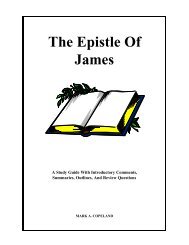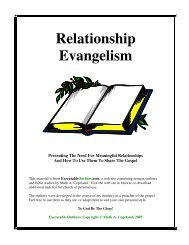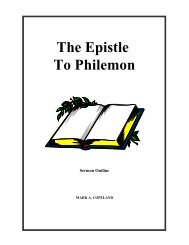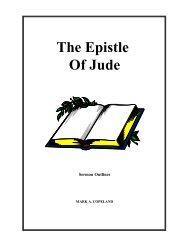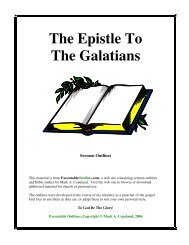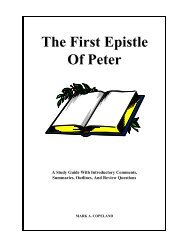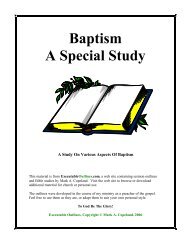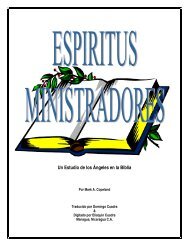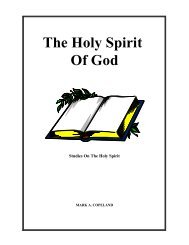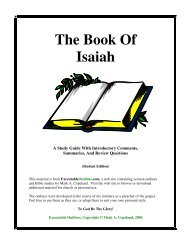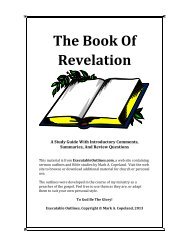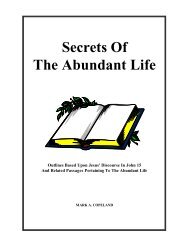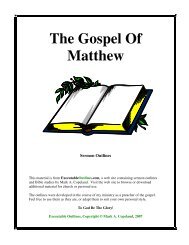The Epistle To The Hebrews - Executable Outlines
The Epistle To The Hebrews - Executable Outlines
The Epistle To The Hebrews - Executable Outlines
You also want an ePaper? Increase the reach of your titles
YUMPU automatically turns print PDFs into web optimized ePapers that Google loves.
INTRODUCTION<br />
<strong>The</strong> <strong>Epistle</strong> <strong>To</strong> <strong>The</strong> <strong>Hebrews</strong><br />
Introduction <strong>To</strong> <strong>The</strong> <strong>Epistle</strong><br />
1. <strong>The</strong> <strong>Epistle</strong> to the <strong>Hebrews</strong> is a unique book in the New Testament...<br />
a. It begins as an essay - He 1:1-2<br />
b. It progresses as a sermon - He 2:1-4<br />
c. It ends as a letter - He 13:23-25<br />
2. Its contents are deep and challenging...<br />
a. Many Christians find it difficult<br />
b. Some equate its difficulty with the book of Revelation<br />
Mark A. Copeland<br />
3. But for Christians who are willing to take the time to read and reflect upon it...<br />
a. <strong>The</strong>y are reminded of how blessed they are to have trusted in Christ<br />
b. <strong>The</strong>y are impressed with the superiority of Christ and His New Covenant over Moses and the<br />
Old Covenant<br />
c. <strong>The</strong>y are warned of the danger of apostasy and the need for steadfastness in their faith<br />
4. With this lesson, I wish to begin a series of expository sermons based upon this epistle...<br />
a. Yet just as one should not begin a journey without some idea of where they are going<br />
b. So it is beneficial to begin with a preview of this epistle, that we might have an idea...<br />
1) Of where we are headed<br />
2) And what we can expect to find<br />
[Such a “preview” or introduction would naturally include some information on...]<br />
I. THE BACKGROUND TO THIS EPISTLE<br />
A. THE AUTHOR...<br />
1. <strong>The</strong> author does not identify himself<br />
2. Many believe it to be the apostle Paul (e.g., Clement of Alexandria)<br />
a. This seems unlikely in view of the author’s statement: “...was confirmed to us by those<br />
who heard Him,” - He 2:3<br />
b. For Paul declared that he had not received the gospel from or through men - Ga 1:<br />
11-12<br />
c. Yet there are many arguments which favor Paul as the author (cf. New Testament<br />
Commentary on <strong>Hebrews</strong>, Robert Milligan, pp. 5-19)<br />
3. Other names have been proposed over the years:<br />
a. Barnabas (suggested by Tertullian)<br />
b. Apollos (suggested by Luther)<br />
c. Priscilla (suggested by Harnack)<br />
-- Perhaps Origen says it best, “But who wrote the epistle, to be sure, only God knows.”<br />
B. THE RECIPIENTS...<br />
1. <strong>The</strong> general consensus is that this letter was written to Jewish Christians<br />
Sermons From <strong>Hebrews</strong> 3



